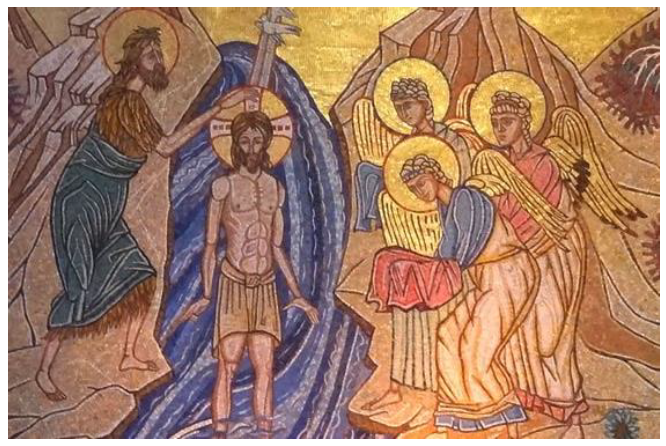
By F. Luis Casasus, General Superior of Idente missionaries
Commentary on the Gospel of 6 and 7-1-2018, Epiphany and the Baptism of Christ. (jBook of Genesis 15:1-6.21:1-3; Letter to the Hebrews 11:8.11-12.17-19; Luke 2:22-40)
(Look carefully at the picture, please)
Saturday 6th is Epiphany, and Sunday is Baptism of Christ. But some churches move the feast of the Epiphany to the nearest Sunday. For example, the Roman Catholic Church in the United States will celebrate Epiphany on Sunday, January 7th. The season after Epiphany has much to do with beginnings: the beginning of Jesus’ apostolic life, the calling of the disciples, and his first miracle in Cana. All of this helps us see Baptism also for us as a starting point: Thus we understand the full meaning of Epiphany, presented by Paul in the way in which he himself understood and practiced it. The Apostle’s task is to spread the Gospel throughout the world, proclaiming to mankind the redemption wrought by Christ and to lead all humanity on the path of salvation, manifested by God on the night in Bethlehem. The Church’s missionary activity, through its many stages down the centuries, finds its starting point and universal scope in the feast of Epiphany (Saint John Paul II, 6 January 1996). And what about you and me? The universality of the Gospel is not just a truth for “the Church”, it is a principle we have to obey and personally apply. The “translation” of this universality to our own life can be fully understood from the view point of our Apostolic Vow: To be an apostle is a permanent state: always and everywhere. Sometimes I cannot even imagine that the person appearing before me is now hungering for a testimony, thirsting for a new life. Sometimes I forget that the Holy Spirit is hastening to arrive to a soul. Maybe I imagine that the current moment is just a time of waiting between two activities… Perhaps because I am alone and do not believe in the apostolate of prayer? Maybe because I am concerned about something? Perhaps because I think that the person in front of me will never be a religious?
The universal hunger and thirst for God is exemplified in the pilgrimage of the three wise men that came to Jerusalem from the East in search of the Infant King. They are rightly called wise because they know that unless they find God, their lives would not be complete. In the end of their pilgrimage, the Magi went their own way, and because they refused to be seduced by the cynicism and pessimism, because they allowed themselves to be surprised by this great joy, the star to which they had committed themselves appeared again. This is not only the description of the times into which Jesus was born, but also our times. The Magi encountered God through their dreams. Their dreams express the deepest aspirations of every human being. Our dreams form a continuous pathway to heaven; often some of them show us how the things of this world are transient, they come and go. Other times, they reveal who we are, our innermost needs. Even our most generous and compassionate dreams sometimes become unachievable…and again this brings us closer to God.
As an external sign, the Magi had only seen the star rising. They then set off across the desert and maybe the star appeared now and then and here and there. They thought that the new born king would be in Jerusalem, and, to top it all, unknowingly, they were used by Herod to be his agents. If the Wise Men were led by a star to find the newborn king who is in truth the universal savior, this implies that the entire cosmos speaks of Christ, even
though its language is not yet fully intelligible to man in his present state, as Pope Benedict states.
Certainly, the Magi catch our attention because we see much of our faith journey in them. Like the star that guided the Magi, we also feel the call to faith and to follow Jesus, sometimes in a very subtle way, in many occasions through the witness of a person or –even better– of a community. Yet we know by now that following Jesus is not always a path of roses and sweet delights. Many times we wonder what God’s will could be for us and what direction should we take.
But like the Magi, we have to move on because there is no turning back. And along the way, we will meet the new Herods of this world. We will be used, cheated, taken advantage of, and misled. But God will still draw straight with those crooked lines. Like the Magi who had to face disappointment when they found out that Jerusalem was the end of their journey, we too will face disappointment when we cannot understand ourselves, our neighbors or the will of God.
Yes, at the wish of the Holy Spirit, we often experience impotence, contrariety and emptiness when we do not get what we prayed for or that things did not turn out as we hoped or expected. But Christian hope, as Pope Francis said, is the ability to go beyond human reasoning, wisdom and prudence of the world, beyond what is normally considered common sense, to believe in the impossible. This is the work of the Holy Spirit in the Magi and also in our souls, the fruits of his gifts.
To this should be added, as disciples of our father Founder, that we have to walk like the Magi, not only in the presence of the Lord, but also in the presence of our sisters and brothers. Have you ever wondered the meaning of walking in the presence of someone? It is an excellent metaphor of how our lives are connected: My neighbor’s, my own life and the life of Jesus.
St. Francis of Assisi told the story of how the power of Jesus’ Spirit changed him: I remember the first victory of my new heart. All my life I panicked when I met lepers. Then one day on the road below Assisi, I did one of those surprising things that only the power of Jesus’ Spirit could explain. I reached out and touched a leper, a man the very sight of whom nauseated me. I felt my knees playing tricks on me, and I was afraid I would not make it to the leper.
The smell of rotting flesh attacked my senses – as if I were smelling with eyes and ears as well as nose. Tears began to slide down my cheeks because I thought I would not be able to do it. Then, as I began to lose my composure, I grabbed the man’s hand and kissed it. In doing so, I received more than I gave. In finding that leper I found Christ.
Saint Francis, very much like the Magi, displayed something of the always surprising fruit of the Spirit – indeed he shows us what it is to live a Spirit-filled life, as mirrored by Jesus and as described in the Letter to the Romans, through encouraging others and in the serving, and contributing to the needs of others.
That is the story of our life. It should always end up in glory. We should never be content in achieving the half-way good. Something much better awaits in the end. We should never be disheartened by the lows of living and the blows that come our way. We should never give up and quit. The prospects of a glorious end should excite us and inspire us to keep on running until the glory that is desired by God for the faithful is handed on to us. But even the
star, which symbolizes the gifts of the Holy Spirit, would not have sufficed had the Magi not been people inwardly open to the truth and followed faithfully that light that filled their hearts. This is our own situation, our own challenge.
We see in the short story of the Magi three reactions to Christ, which will follow him throughout his life: hatred and fear (Herod), indifference (the scribes), and adoration (the Magi). It remains so today.
What Herod sees as a threat, the Magi see as a gift. What the Jewish academics miss, the pagan scholars have sought in faith. The Magi were willing to make the journey, leave their homes behind, risk the good opinion of fellow scholars, and do whatever was required to find the King of the Jews.This is why they are a role model to be followed in our Vow of Cathedra.
On this day, let us firmly intend to be like the Magi, who after being in the presence of Jesus as a child, changed their lives, sought justice and mercy, and were ever transformed for the rest of their days. We ask Mary, who showed to the Wise Men the new King of the world (cf. Mt 2:11), as a loving mother, to show Jesus Christ also to you and to help you to be guides along the way which leads to him.
I remember our father Founder saying that the first fruit we get as we approach to receive Holy Communion is an apostolic fruit (not his textual words): we give testimony of our weakness and humility by showing our hunger and thirst for the best gift that Christ has given to us: his presence.
Similarly, perhaps the first thing we have to think about in the Baptism of Jesus is his witness of humility and obedience, by submitting to baptism before He began His public ministry, Jesus was baptized in obedience to God’s plan and probably at the expense of losing his reputation, because John’s baptism was intended for sinners and Jesus being God’s Son was sinless, so his submission to baptism becomes a manifestation of his self-emptying.
Pope Benedict reminds us that what John administered was a penitential act, a gesture of humility to God that invited a new beginning: by immersing themselves in the water, penitents recognized that they had sinned, begged God for purification from their sins and were asked to change wrong behavior, dying in the water, as it were, and rising from it to new life.
For this reason, when John the Baptist saw Jesus who had come to be baptized with sinners he was amazed; recognizing him as the Messiah, the One who is without sin, John expressed his consternation: he, the Baptist, would himself have liked to be baptized by Jesus.
Because of his humility and obedience on this occasion, the Father revealed him as his beloved Son. Note that the voice does not speak to Jesus, but identifies Jesus as “my son,” the divine son known from Psalm 2 and from the Roman imperial ideology that classified the emperor as divi Filius, the son of God. Here, in fact, was the true son of God made manifest. Even more, the son of God is revealed in the context of the Father and the Holy Spirit; the glory of the Trinity is manifested.
Why did Jesus need to be baptized? It is the wrong question. Rather, why did we need Jesus to be baptized? Because we needed to know these things. As so often in the life of Jesus, the divine obedience, the profound humility is also for us. It is another way of Jesus saying: Follow me! It was an eminently pedagogical act.
Let us recall a moving example of faithfulness to this attitude of Jesus: When leprosy broke out in the Hawaiian Islands in the 19th century, the government authorities established a leper colony on the remote island of Molokai. The victims were snatched by force from their families and sent to this island to perish. A young Belgian priest, Damien De Veuster, asked permission from his superiors to minister to them. Straightaway he realized that there was only one effective way to do this, and that was to go and live among them. At first, he tried to minister to the lepers while maintaining a certain distance. But he soon realized that he had to live among them in order to gain their trust. As a result, he contracted leprosy himself. The reaction of the lepers was immediate and wholehearted. They embraced him and took him to their hearts. He was now one of them. There was no need, no point any more, in keeping his distance. The lepers had someone who could talk with authority about leprosy, about brokenness, about rejection and public shame. Today’s gospel tells us how, by receiving the baptism of repentance, Jesus became identified with the sinners whom he had come to save.
Again ¿How can I apply this attitude to my life? Surely, the answer is based on the concept of mercy, the forgiveness I have received and my experience, albeit limited, of forgiving.
At his Baptism in the Jordan, Christ reveals himself to repentant sinners. The Baptism of the Lord Jesus is the great event celebrated by the Eastern churches on the feast of Epiphany because it is the occasion of the first public revelation of all the Three Persons in the Holy Trinity, and the official revelation of Jesus as the Son of God to the world by God the Father. It is necessary to teach the children and the young people to recognize God as Father and to be able to relate to him with a filial attitude. God is also telling us: these are my children, children in whom I am pleased. The Heavens’ opening indicates that there is was (and remains) a moment of God’s powerful intervention in human history and in the life of His Son and, in the same way of all us, his children. God is no longer very distant from us, he is not a reality to be discussed – whether he exists or not – but we are in God and God is in us. He draws us towards himself, he draws us into true life. He leads us through the often foggy sea of our personal life story. We are not only children of God but also His heirs, that is to say, we enjoy the same privileges and rights as Christ, our brother: If children, then heirs, heirs of God and fellow heirs with Christ, provided we suffer with him in order that we may also be glorified with him (Rom 8:17).
He gave us the power to do the same as well: He who believes in me will also do the works that I do; and greater works than these will he do, because I go to the Father (Jn 14:12). This power is the Holy Spirit living in us, given to us in baptism. Jesus told the disciples: Go into all the world and preach the gospel to the whole creation. He who believes and is baptized will be saved; but he who does not believe will be condemned. And these signs will accompany those who believe (cf Mk 16:15-18).
In the sacramental rite of Baptism, there is a solemn renunciation of the world and an acknowledgment of Jesus Christ as Lord. This conversion is exactly to which we are invited during the Eucharist when the celebrant says: Lift up your hearts! Therefore, Baptism extends itself to our whole life.
It is not an act of an hour, rather it is a journey of our whole life. In reality, behind this is also the doctrine of the two ways, which was fundamental in early Christianity; there are only two ways to live: a way to which we say “no” and a way to which we say “yes.” The way of
death, and the way of life.
Thus the positive formula of Baptism is also a dialogue: it is not only something to understand, it is a dialogue of God with us, an action of God with us, and a response of ours, as we answer in the Eucharist: We lift them to the Lord. It is a lifetime journey.
Jesus’ baptism reminds us of our mission: to experience the presence of God within us, to acknowledge our own dignity as God’s children, and to appreciate the Divine Presence in others by honoring them, loving them and serving them in all humility.












